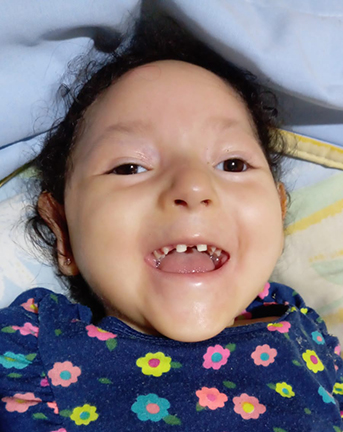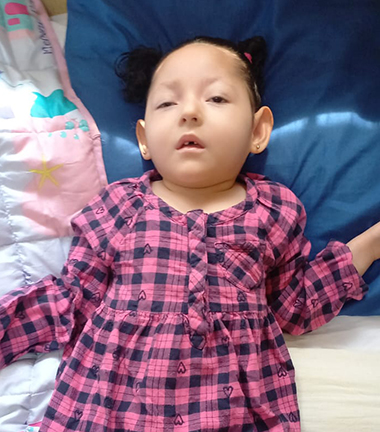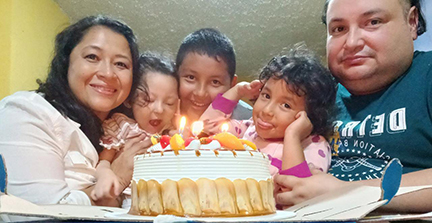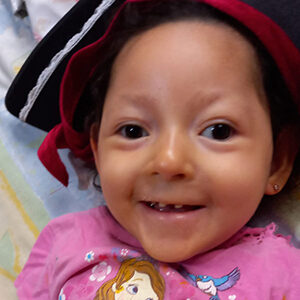By Eduardo Mayora
First of all, I want to thank you for letting me and my family join the National Foundation for Ectodermal Dysplasias (NFED).
I know, it took me a while — almost a year — to finally find the internal strength in my heart and mind to be able to write our story. It is a story of our family fighting against all odds to save our baby. There have been many ups and downs, and many, many tears have been shed.
Several times, we have been on the verge of losing our precious Arantxa. Every fight we had to get her better has made us stronger, more patient, and wiser. But despite that, we still often fall down and feel so helpless. But after these times, we stand up again and prepare for the next hard time to come.
Mosquito Bites on Our Newborn?
Arantxa came to our family four years ago. She was born at the 39th week — a gorgeous, white-pinkish, large baby. All of the normal tests were done, and I had the greatest luck to be able to be in the operation room from start to finish. I received her and was able to be the first to hold her. Four or five days after birth (I do not remember that well), she was given to us. Special clothes were purchased, and her brothers, my wife and I were anxious to get her home. To my surprise, she had several “mosquito bites” all over her body. I was raging mad. How could it be that in the maternity room there where mosquitoes?
I screamed like crazy, banged tables and front desks, and scared several people that day. I was so frustrated that the hospital could not save my baby from mosquitoes. After that, we took her home. All went well, and we were a super happy family of five. Just a few days later, the “mosquito bites” turned into yellowish blisters, and we thought maybe the sun or the soap in her clothes did that. My wife started to fret immensely thinking she was a bad mother.
The Shaking Begins
On the second week after her birth, the nightmare embraced all of us. Arantxa started to shake like she was cold. In our ingenuity, we put several blankets on her and just prayed for her to stop being cold. When she did not stop shaking, probably 30 minutes or so, we decided to go to the hospital. For sure, something was really wrong. We went from hospital to hospital, and no one wanted to accept her; I guess because they did not knew what was wrong or simply they thought she was not going to live through that night.
At the third hospital, she was accepted and placed in the pediatric ICU. By this time, she had had more than five hours of nonstop seizures. The doctor that took her had no idea about incontinentia pigmenti (IP), which is the type of ectodermal dysplasia she would later be diagnosed with. My baby had 47 seizures in a period of three weeks in the ICU.
The doctor talked to us and dropped the biggest bomb that I have ever felt in my life. He told us that it would be wise to baptize her and prepare for the worst. According to our beliefs, a priest came, and she was baptized. Several drugs were tested on her, and none were doing what was expected — to stop the seizures.
Finally, the accurate drug and dose were found, and her brain was doped. I had never seen a baby doped before, but that moment of her being there but not being there is engraved in my mind forever. I still remember that moment every time she has seizures again. Once the medicine was set, it caused another problem for her. Because the medicine was so strong, it impacted her liver, and cirrhosis was around the corner. The doctor told us that the only goal now was to stop her seizures at all costs. Later, the liver was going to be a priority.
We Sold Everything

In a country where the most prestigious doctors do not know about IP or only have one or two patients, a patient like my baby needed a huge guardian angel and lots of cash. In Guatemala, in Central America, money is the difference between living or dying. My wife and I sold everything we had — car, stuff, jewelry, everything. We sold it all to pay for hospital bills and medicine, and still this was not enough. We even did theatrical plays to get some money. I am ashamed to admit it, but several times I wondered if it would be better for all of us to just let her go. It even crossed my mind to rob a bank to pay for bills. If you would be able to see me, you would realize that I am not even able to steal a candy. But, it did cross my mind.
Our marriage, our other kids, and even our religious beliefs were shaking like a twig. I was a raging mad person every day, just wanting to have a fight with anyone, for anything. My frustration was huge. The sense of not been able to help Arantxa made me think it was a punishment for something I did before or that bad juju was done to us. (Yes, in my country people believe in this. I do not, but it still crossed my mind.) The worst part for me, as a father, — which probably is a theme that is not said often because mothers are the ones that handle this situation more — was to present myself to everyone as this log in the ocean where a sailor will hold himself as a last resource. But inside, I was shaking and feeling so afraid, hopeless, and impotent.
It is a backwards feeling I know. But as a provider in the family, I felt like I was not doing my job. I had to have two faces — one I presented to the world as a person who had it all under control and was calm and steady. The other face was just for me — a person who needed help from anybody, who felt that his castle was being demolished one brick at the time.
The love for my family and especially this little baby who is by my side as I write these lines, gave me the strength to overcome and make the best of it.
Finding Help

If I was not going to get the proper medical help for her in our country, then I was going to get it outside. My wife and I took every course, training, seminar and more to get as much information as possible regarding IP and how to handle the seizures.
A skin biopsy was done to corroborate what we already knew, Arantxa was affected by incontinentia pigmenti. It will be in our life forever. They did several tests on her, and we discovered that the first seizures she had were in the womb. Because of this, she has leukomalacia and West syndrome. Since then, we have been on a roller coaster of emotions. Sometimes we are happy that she makes progress. Sometimes the seizures make her lose some of her normal faculties. The last big seizure she had made her lose the ability to suck. Can you imagine a baby that forgets how to suck?
For an entire year, we had to feed her with a syringe to which I had glued a rubber nipple. I took turns with my wife to sleep because we were afraid of her having a new seizure and not being ready. It started to cause trouble for me at work. I was asleep all the time and did not work as expected. My wife was sad all the time and started to release her frustration on everyone who crossed her path. We have been so close to losing Arantxa so often that we could even taste the bitterness of death. But thanks to God, she is still with us. Four years have passed, and she is my companion. Every time I have to work at home, she is by my side. We talk; we play; we sleep together. I am not sure for how long she will be with us, but for sure, I do not want to miss a thing.
We Often Know More Than Doctors

We have learned a lot. My wife and I are not doctors. But, if it has something to do with the baby, we know what to do and we will fight with everyone to get her the best treatment she needs. In Guatemala, the last official count was that there were only three babies with IP. We often need to fight with doctors and nurses to get them to accept what we say is the starting point and not lose time by doing tests or checking things that are not the root of her problem. I have been kicked out of so many hospitals because doctors want to start with a different approach when a seizure comes and not start from what we already know is the cause. In a country where IP is so rare, we tend to be the people with more knowledge about it. This makes me very happy but also very afraid.
My wife and I now focus on preparations for the next battle. We know it will come. We do not know if it will be handled by us or if a hospital will be needed. But our minds and hearts are ready to fight whatever comes to us. And after this fight has passed, as we have done for four years now, we will prepare for the next one to come.
If I have learned something with Arantxa is that I do not need to find the meaning of her IP. I just need to accept it and make the best out of it.
I hope she stays with us for several years. But, if this does not happen, I will be happy knowing that I did almost the impossible — to make her feel loved and safe no matter what. I am sure mothers will do everything possible for their children. But this father will do what is not written just to see her laugh.
To everyone fighting this battle. I tell you this:
Do your best no matter what and let it be in God’s hands. It is not our call to change the result, but it is our task to present it to the big one and let him decide what the outcome will be.
- Eduardo Mayora is a guest blogger for the NFED. He and his family live in Guatemala. His daughter, Arantxa, is affected by incontinentia pigmenti.
